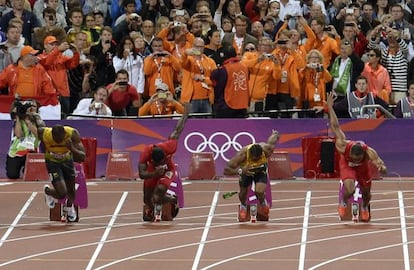The Spaniard who keeps Bolt on his toes
Jordi Roig, one of six IAAF-qualified race starters, fired the shot that fueled a legend

“At the moment of the start, the shot, I decide, not a machine,” says Jordi Roig in his irrevocable Catalan-Valencian accent. “When I say ‘on your marks,’ the athletes hear it through a small speaker in their blocks and a judge makes sure they have their feet firmly on them and their fingers behind the line; when that judge gives me the ok, I shout ‘set.’ That’s when my eye comes into play. Everything is in my eye. When I see that all the athletes are set, I fire.”
Roig, one of six International Association of Athletics Federations (IAAF)-qualified start judges, was selected to oversee the most anticipated race of the 2012 Olympics, perhaps of any Games. “When they told me I felt great happiness and also great responsibility.
Little wonder: when the IAAF in 2009 changed the rules governing false starts, it could not have imagined that reigning Olympic champion and world record Usain Bolt would fall foul of them in the World Championships 100m final in Daegu two years later. Until 2001, every athlete could false start once without risking disqualification but this led to several aborted starts on occasion and suspicions of gamesmanship. The rule was subsequently changed to allow just one false start per field of athletes, with instant dismissal resulting from the next infraction. Three years ago, it was decided that any athlete jumping the gun would be instantly sent from the track.
Everything is in my eye. When I see that all the athletes are set, I fire”
After Bolt’s false start in Daegu there were calls to alter the rule for London, amid fears that a false start in the 100m final could ruin the spectacle. The International Olympic Committee remained unmoved. As have athletes in London, at least until the sound of a shot has filled the stadium.
“The athletes have taken on the rule perfectly and they always wait for the shot,” says Roig. “The few false starts there have been have come in combined events, like heptathlon [where the rule does not apply].”
A reaction time of fewer than 0.10 seconds is considered anti-physiological and therefore a false start. Technology is ever-more prevalent in recording times and monitoring false starts but the final decision is always human. At the moment of firing the starter’s pistol, Roig dons a pair of earphones through which Omega technicians relay whether a false start has occurred or not. If Roig hears a beep, he fires another shot to signify a false start. At these Olympics, merely jiggling a foot in the block is not considered a false start. Only when a running shoe and block are separated entirely do the workings of Omega’s technology spring into life.
When everything is in place, Roig decides when all the athletes are in position. One of his greatest problems is keeping his eye on the tactics of some runners, who waste time and fidget to make their opponents lose concentration. “And at that moment, if I make a mistake and fire before all the athletes are in position, I am to blame for the false start,” says Roig.
Tu suscripción se está usando en otro dispositivo
¿Quieres añadir otro usuario a tu suscripción?
Si continúas leyendo en este dispositivo, no se podrá leer en el otro.
FlechaTu suscripción se está usando en otro dispositivo y solo puedes acceder a EL PAÍS desde un dispositivo a la vez.
Si quieres compartir tu cuenta, cambia tu suscripción a la modalidad Premium, así podrás añadir otro usuario. Cada uno accederá con su propia cuenta de email, lo que os permitirá personalizar vuestra experiencia en EL PAÍS.
¿Tienes una suscripción de empresa? Accede aquí para contratar más cuentas.
En el caso de no saber quién está usando tu cuenta, te recomendamos cambiar tu contraseña aquí.
Si decides continuar compartiendo tu cuenta, este mensaje se mostrará en tu dispositivo y en el de la otra persona que está usando tu cuenta de forma indefinida, afectando a tu experiencia de lectura. Puedes consultar aquí los términos y condiciones de la suscripción digital.








































